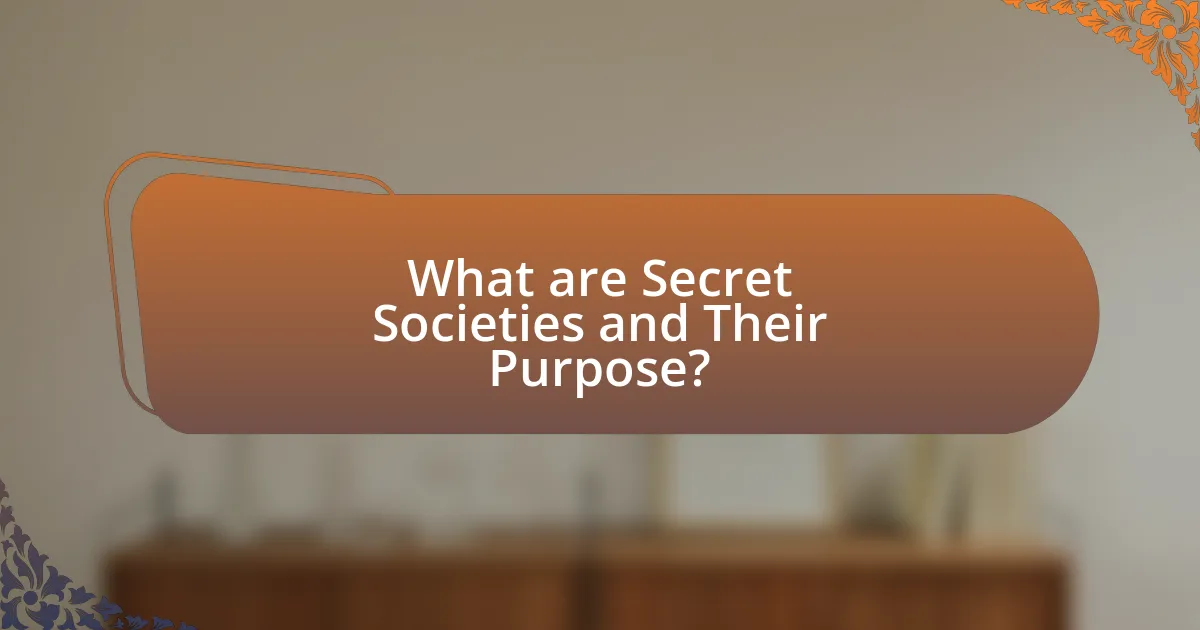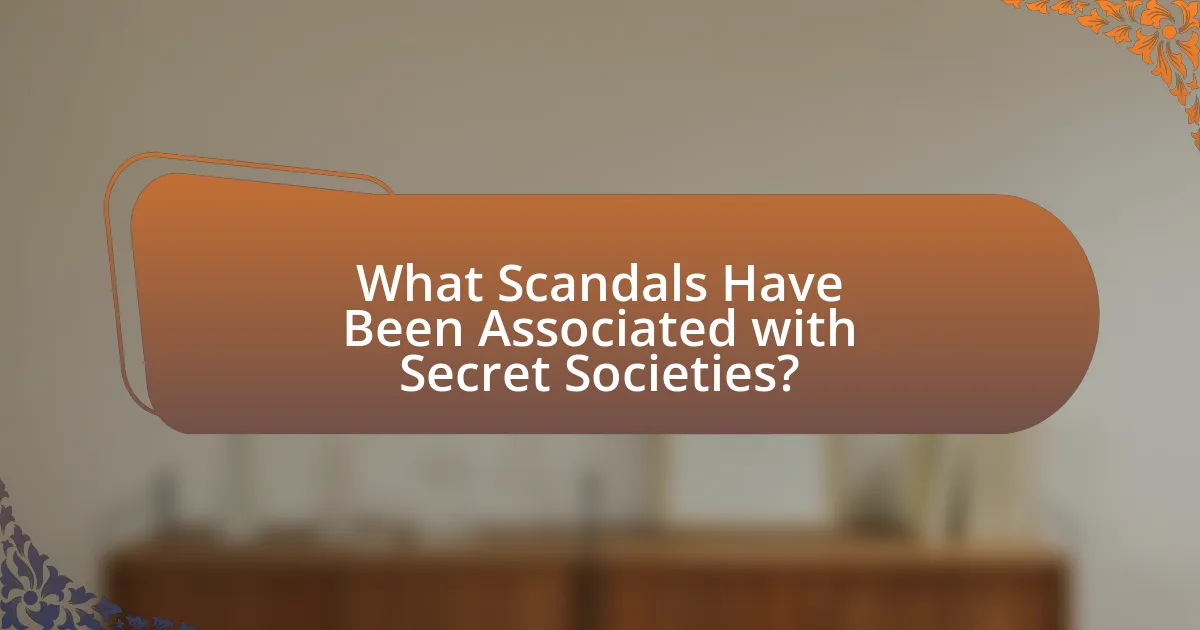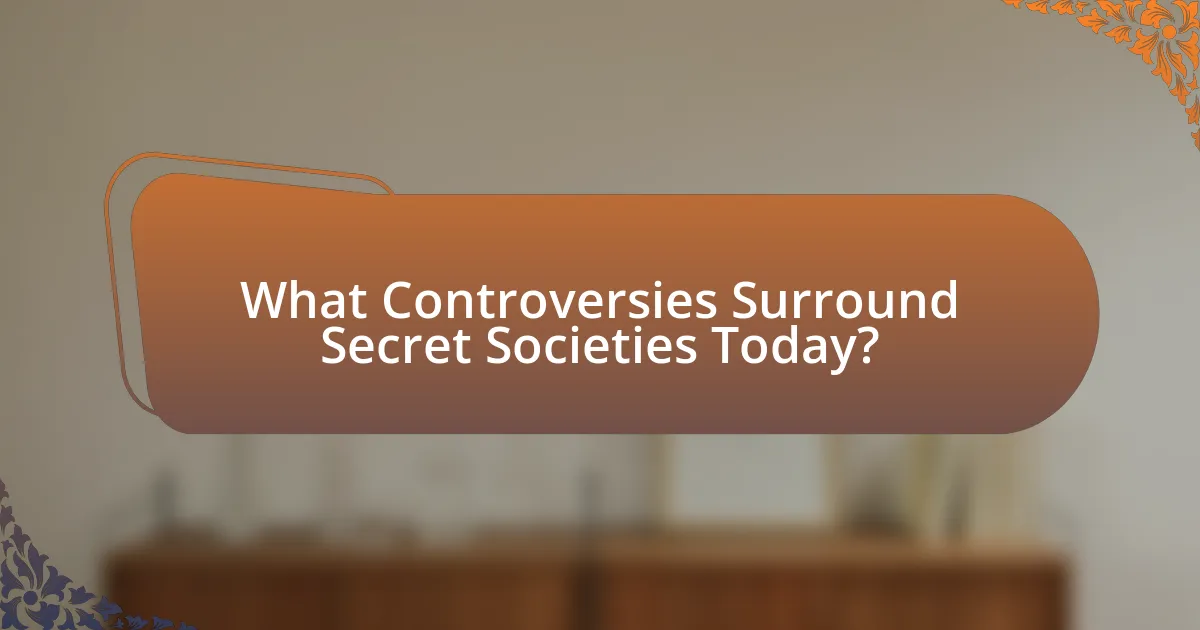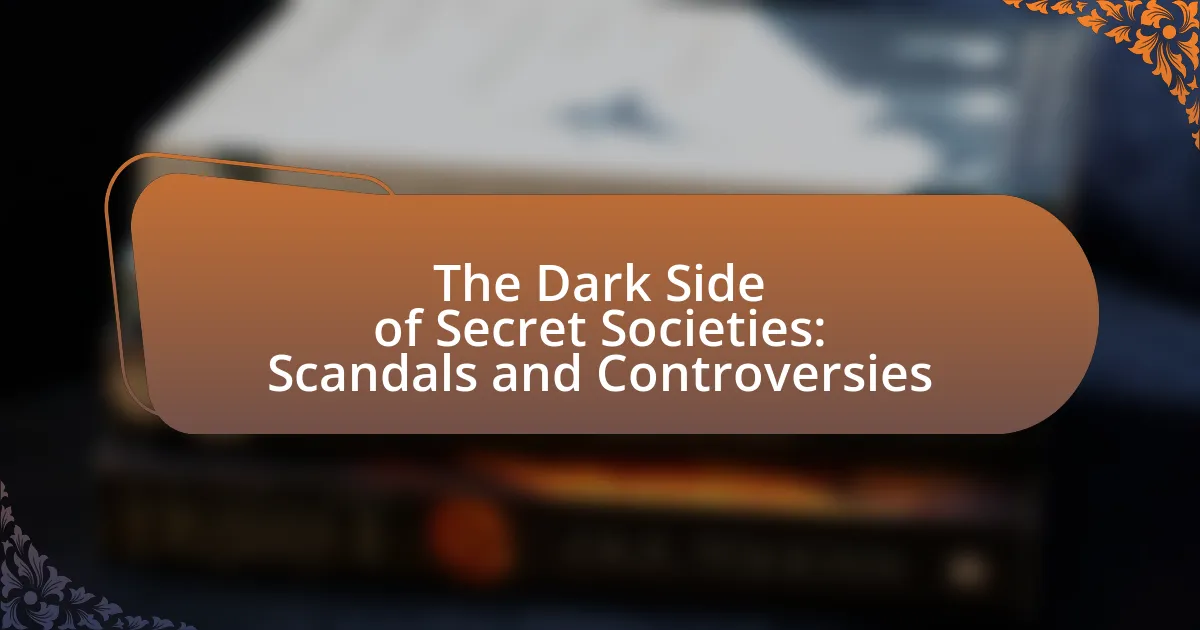Secret societies are exclusive organizations characterized by secrecy, private membership, and specific ideologies, often pursuing shared interests and exerting influence in society. This article explores the operations, motivations, and controversies surrounding these groups, including historical examples like the Freemasons and the Illuminati. It examines how members gain entry, the ethical dilemmas they present, and the impact of scandals on public perception. Additionally, the article discusses the relationship between secret societies and conspiracy theories, highlighting the legal and ethical issues they raise in contemporary society.

What are Secret Societies and Their Purpose?
Secret societies are exclusive organizations that often operate under a veil of secrecy, typically characterized by their private membership, rituals, and specific ideologies. Their purpose generally includes the pursuit of shared interests, the promotion of social or political agendas, and the establishment of networks for influence and power. Historically, groups like the Freemasons and the Illuminati have been associated with various societal roles, including philanthropy, political maneuvering, and the preservation of knowledge. The existence of these societies has led to numerous controversies, often fueled by conspiracy theories regarding their influence on global events and governance.
How do secret societies operate within society?
Secret societies operate within society by forming exclusive groups that often engage in clandestine activities, rituals, and networking to exert influence and maintain secrecy. These organizations typically recruit members based on shared interests or ideologies, creating a sense of loyalty and commitment among participants. Historical examples include the Freemasons and the Illuminati, which have been linked to political and social movements, suggesting that their operations can impact governance and societal norms. The influence of secret societies is often amplified through their ability to connect powerful individuals, facilitating decisions that may not align with public interests, as seen in various political scandals throughout history.
What are the common characteristics of secret societies?
Common characteristics of secret societies include exclusivity, secrecy, and a hierarchical structure. Exclusivity refers to the limited membership, often requiring initiation rituals or specific qualifications for entry. Secrecy is a defining trait, as members typically engage in confidential discussions and activities, often shrouded in mystery to outsiders. Hierarchical structure indicates a clear chain of command, where higher-ranking members possess more influence and access to privileged information. Historical examples, such as the Freemasons and the Illuminati, illustrate these traits, as they have maintained strict membership criteria, conducted clandestine meetings, and established ranks within their organizations.
How do members gain entry into these societies?
Members gain entry into secret societies primarily through invitation or sponsorship by existing members. This selective process often involves a vetting phase where potential candidates are assessed based on their social standing, connections, or shared interests with current members. For example, many prestigious societies, such as the Freemasons or Skull and Bones, require candidates to be nominated by a member, ensuring that only those who align with the society’s values and objectives are considered. This exclusivity is a key characteristic of secret societies, reinforcing their mystique and the perception of elite membership.
Why do individuals join secret societies?
Individuals join secret societies for various reasons, including the pursuit of social connections, shared beliefs, and the desire for influence. Many members seek a sense of belonging and community that these exclusive groups provide, often fostering deep interpersonal relationships. Additionally, individuals may be attracted to the perceived power and status associated with membership, as secret societies often include influential figures from various sectors, such as politics, business, and academia. Historical examples, such as the Freemasons and Skull and Bones, illustrate how these organizations have historically offered networking opportunities that can lead to significant career advancements and social capital.
What motivations drive membership in secret societies?
Membership in secret societies is primarily driven by the desire for exclusivity, social networking, and the pursuit of power. Individuals often seek these organizations for the opportunity to connect with influential peers, gain access to resources, and enhance their social status. Historical examples, such as the Freemasons and the Illuminati, illustrate how members have leveraged these connections for political and economic advantages. Additionally, the allure of secrecy and the promise of shared knowledge can motivate individuals to join, as seen in various societies that emphasize esoteric teachings and rituals.
How do personal beliefs influence the decision to join?
Personal beliefs significantly influence the decision to join secret societies by shaping individuals’ motivations and perceptions of the group’s values. For instance, individuals who prioritize community, exclusivity, or shared ideologies may be drawn to organizations that reflect these beliefs, often seeking a sense of belonging or purpose. Research indicates that personal values, such as a desire for power or social status, can lead individuals to align with groups that promise these outcomes, as seen in studies on group dynamics and social identity theory. This alignment between personal beliefs and the society’s principles can create a compelling reason for individuals to join, reinforcing their commitment and participation within the group.

What Scandals Have Been Associated with Secret Societies?
Secret societies have been associated with numerous scandals, including the Illuminati’s alleged influence over global politics and the Freemasons’ involvement in corruption and conspiracy theories. The Illuminati, founded in 1776, has been accused of orchestrating events to establish a New World Order, a claim lacking concrete evidence but widely circulated in conspiracy circles. The Freemasons, with their secretive rituals and elite membership, have faced accusations of nepotism and political manipulation, notably during the 19th-century scandals involving political figures in the United States and Europe. Additionally, the Skull and Bones society at Yale University has been linked to allegations of elitism and undue influence in American politics, particularly concerning its members’ roles in government. These examples illustrate the controversies surrounding secret societies and their perceived impact on society and governance.
What are some historical scandals involving secret societies?
Historical scandals involving secret societies include the Freemasons’ alleged influence in political affairs, particularly during the American Revolution, where they were accused of manipulating events for their benefit. Another significant scandal is the exposure of the Illuminati in the late 18th century, which led to widespread paranoia and conspiracy theories about their supposed control over world events. The Skull and Bones society at Yale University has also faced scrutiny, particularly regarding its members’ connections to powerful political and economic positions, raising questions about elitism and secrecy in governance. Additionally, the Bohemian Grove, a private club for influential men, has been criticized for its secretive rituals and the potential for political collusion among its members. These examples illustrate how secret societies have been linked to controversies that challenge transparency and accountability in society.
How did the Illuminati become a subject of controversy?
The Illuminati became a subject of controversy primarily due to its association with conspiracy theories that claim it seeks to control world events and governments. Founded in 1776 in Bavaria, the group aimed to promote Enlightenment ideals, but its secretive nature led to suspicions and allegations of sinister motives. Historical events, such as the suppression of the Illuminati by the Bavarian government in 1785, fueled speculation about its influence and existence, leading to a proliferation of conspiracy theories in the 19th and 20th centuries. These theories often link the Illuminati to various global events, suggesting that it operates behind the scenes to manipulate political and economic systems, further entrenching its controversial status in popular culture.
What role did the Freemasons play in political scandals?
The Freemasons have historically played a significant role in political scandals by being implicated in allegations of corruption, favoritism, and undue influence over public officials. For instance, in the early 20th century, the Masonic Order was accused of manipulating political appointments and legislation in various countries, leading to public outcry and investigations. Notably, the 1920s scandal involving the Masonic Lodge in Italy, where members were found to have connections with organized crime and political corruption, exemplifies how their secretive nature contributed to political controversies. Additionally, the perception of Freemasonry as a clandestine organization has fueled conspiracy theories, further entangling them in political scandals throughout history.
How do modern scandals reflect on secret societies?
Modern scandals often highlight the perceived secrecy and influence of secret societies, suggesting a correlation between hidden agendas and public controversies. For instance, the exposure of high-profile individuals linked to organizations like the Freemasons or the Illuminati during scandals can amplify public suspicion regarding their roles in political or economic decisions. This is evident in cases such as the 2016 U.S. presidential election, where conspiracy theories about secret society involvement gained traction, reflecting societal anxieties about transparency and accountability. Such scandals reinforce the narrative that secret societies operate behind the scenes, shaping events while remaining obscured from public scrutiny.
What recent events have brought secret societies into the spotlight?
Recent events that have brought secret societies into the spotlight include the public scrutiny of organizations like the Freemasons and the Illuminati, particularly in the context of conspiracy theories surrounding political and social movements. For instance, the rise of social media has amplified discussions about these groups, especially during significant political events such as the 2020 U.S. presidential election, where allegations of secretive influence emerged. Additionally, high-profile individuals, including politicians and celebrities, have been linked to these societies, fueling public interest and debate. The combination of these factors has led to increased media coverage and public discourse regarding the activities and perceived power of secret societies.
How do these scandals affect public perception of secret societies?
Scandals significantly diminish public perception of secret societies by fostering distrust and suspicion. When high-profile scandals, such as those involving political figures or influential organizations, come to light, they often reinforce negative stereotypes about secrecy and elitism associated with these groups. For instance, the exposure of unethical practices within organizations like the Freemasons or the Bohemian Grove has led to increased skepticism and conspiracy theories among the general populace. This skepticism is supported by surveys indicating that a majority of people believe secret societies wield undue influence over political and economic systems, further entrenching the perception that these groups operate outside the bounds of accountability and transparency.

What Controversies Surround Secret Societies Today?
Controversies surrounding secret societies today primarily involve allegations of elitism, conspiracy theories, and lack of transparency. Many critics argue that these organizations, such as the Freemasons and Skull and Bones, perpetuate a culture of exclusivity that undermines democratic values. For instance, the secrecy surrounding their rituals and membership processes has led to widespread speculation about their influence on political and economic systems, with some claiming they manipulate global events for their own benefit. Additionally, incidents like the 2016 revelations about the Bohemian Grove, where high-profile individuals gather, have fueled concerns about the potential for collusion among powerful elites. These controversies highlight ongoing debates about accountability and the ethical implications of secretive networks in contemporary society.
How do conspiracy theories relate to secret societies?
Conspiracy theories often depict secret societies as powerful groups manipulating events behind the scenes. This relationship stems from the secretive nature of these societies, which fuels speculation and distrust among the public. For instance, organizations like the Freemasons and the Illuminati have been subjects of numerous conspiracy theories suggesting they control political and economic systems globally. Historical events, such as the alleged involvement of secret societies in the French Revolution or the American Civil War, provide context for these theories, as they highlight instances where such groups were believed to exert influence during critical moments in history.
What are the most prevalent conspiracy theories about secret societies?
The most prevalent conspiracy theories about secret societies include the belief that organizations like the Illuminati and Freemasons manipulate global events and control governments. These theories often suggest that secret societies operate behind the scenes to establish a New World Order, where a select few hold power over the masses. For instance, the Illuminati is frequently cited as a group that allegedly seeks to create a totalitarian world government, a claim rooted in historical references to the Bavarian Illuminati founded in 1776, which aimed to promote Enlightenment ideals but has since been exaggerated into a narrative of global domination. Additionally, theories surrounding the Freemasons often involve accusations of ritualistic practices and influence in political and economic spheres, supported by their historical presence in various influential positions throughout history.
How do these theories impact societal views on power and control?
Theories surrounding secret societies significantly shape societal views on power and control by fostering skepticism and distrust towards established institutions. These theories often suggest that secretive groups manipulate political and economic systems for their own benefit, leading the public to perceive power as concentrated in the hands of a few rather than distributed among the populace. For instance, the belief in the influence of organizations like the Illuminati or Freemasons has historically fueled conspiracy theories that claim these groups orchestrate global events, thereby reinforcing the notion that control is exercised behind closed doors. This perception is supported by historical instances, such as the Watergate scandal, which revealed the extent of governmental deception and manipulation, further entrenching the idea that power is often wielded in secrecy.
What legal and ethical issues are raised by secret societies?
Secret societies raise significant legal and ethical issues, primarily concerning transparency, accountability, and potential criminal activities. The clandestine nature of these organizations often leads to concerns about their influence on political and economic systems, which can undermine democratic processes and public trust. For instance, secret societies like the Freemasons have historically faced scrutiny for perceived elitism and lack of accountability, raising ethical questions about their impact on social equity. Additionally, legal issues may arise from activities such as conspiracy, fraud, or other illicit behaviors that can occur within these groups, as evidenced by various historical scandals involving secretive organizations engaging in illegal activities.
How do secret societies navigate laws regarding secrecy and privacy?
Secret societies navigate laws regarding secrecy and privacy by employing legal frameworks that protect their operations while adhering to applicable regulations. These organizations often utilize non-disclosure agreements and privacy laws to maintain confidentiality among members, ensuring that sensitive information remains undisclosed. For instance, many secret societies operate under the premise of freedom of association, which is protected by law, allowing them to conduct private meetings without government interference. Additionally, they may leverage loopholes in legislation related to privacy and data protection, enabling them to shield their activities from public scrutiny. Historical examples include the Freemasons, who have successfully maintained their secrecy for centuries by establishing a network of legal protections and cultural norms that discourage disclosure.
What ethical dilemmas arise from the actions of secret societies?
Secret societies often create ethical dilemmas related to secrecy, power dynamics, and accountability. The clandestine nature of these organizations can lead to a lack of transparency, which raises questions about the morality of their actions and decisions. For instance, when members engage in activities that may benefit themselves at the expense of the public good, it creates a conflict between personal interests and societal responsibilities. Historical examples, such as the role of the Freemasons in political influence, illustrate how secretive agendas can undermine democratic processes and ethical governance. Additionally, the potential for manipulation and exploitation within these groups poses significant ethical concerns, as seen in cases where members have prioritized loyalty to the society over ethical standards.
What can individuals learn from the controversies of secret societies?
Individuals can learn about the complexities of power dynamics and the impact of secrecy from the controversies surrounding secret societies. These controversies often reveal how hidden agendas can influence political, social, and economic systems, as seen in historical instances like the Illuminati and Freemasons, which have been accused of manipulating events for their own benefit. Furthermore, the public’s reaction to these controversies highlights the importance of transparency and accountability in organizations, as well as the potential consequences of unchecked influence. For example, the Watergate scandal illustrated how secrecy within political circles can lead to significant public distrust and institutional failure. Thus, examining these controversies encourages critical thinking about authority and the ethical implications of secrecy in society.
How can understanding these scandals inform personal beliefs about secrecy?
Understanding scandals associated with secret societies can lead individuals to question the ethics and implications of secrecy in their own lives. These scandals often reveal how secrecy can facilitate manipulation, corruption, and abuse of power, as seen in cases like the Watergate scandal, where concealed actions led to a significant political crisis. By analyzing such events, individuals can recognize the potential dangers of secrecy, prompting them to adopt a more critical stance towards hidden agendas and the necessity of transparency in both personal and societal contexts.
What lessons can be drawn regarding transparency and accountability in organizations?
Transparency and accountability in organizations are essential for maintaining trust and integrity. Organizations that prioritize transparency foster an environment where stakeholders are informed about decisions and operations, reducing the likelihood of scandals. For instance, the Enron scandal highlighted the consequences of a lack of transparency, leading to significant financial losses and a loss of public trust. Furthermore, accountability mechanisms, such as regular audits and clear reporting structures, ensure that individuals within organizations are held responsible for their actions, which can deter unethical behavior. Research indicates that organizations with high levels of transparency and accountability experience better performance and employee satisfaction, as seen in studies by the Harvard Business Review.
